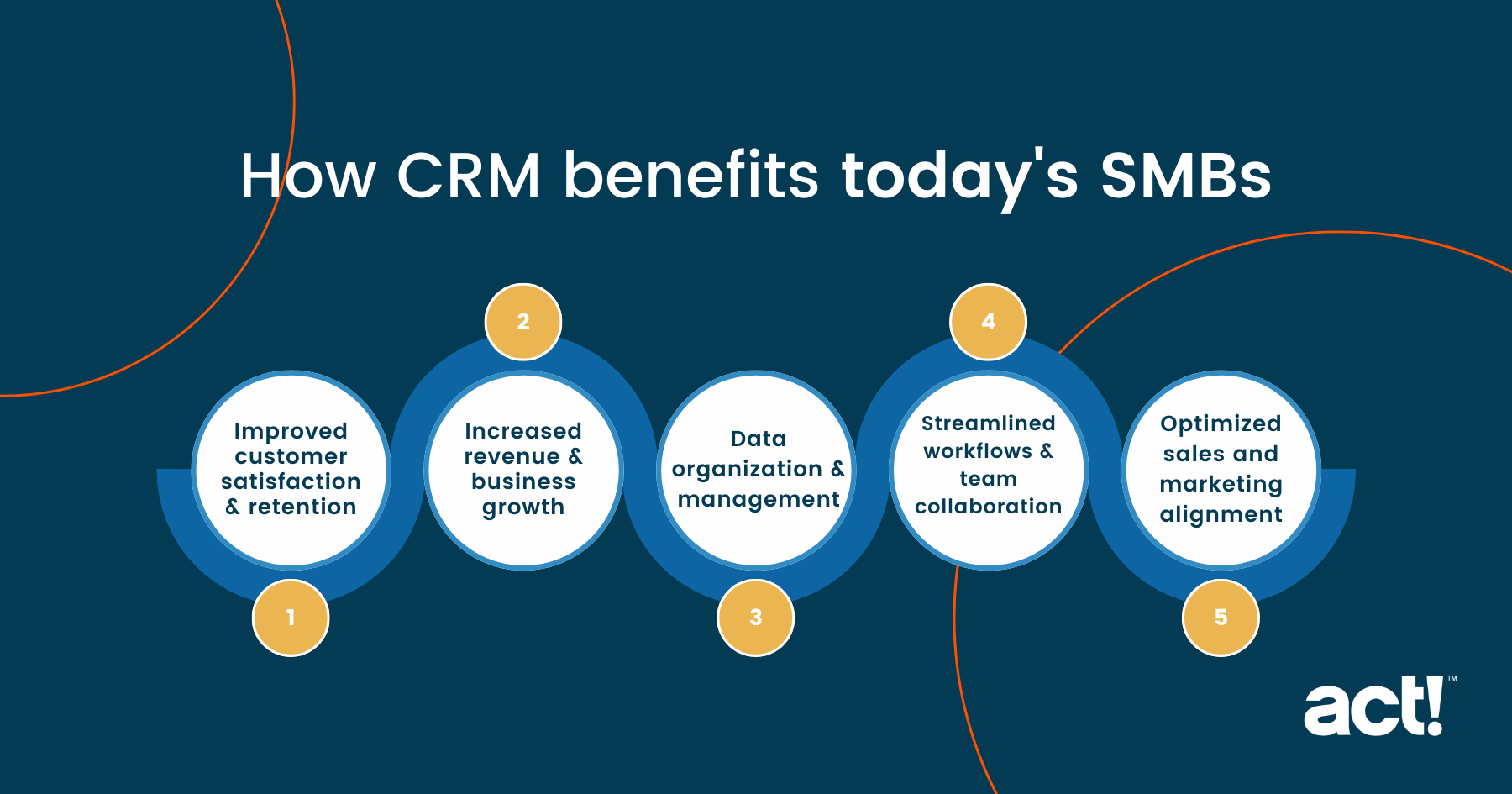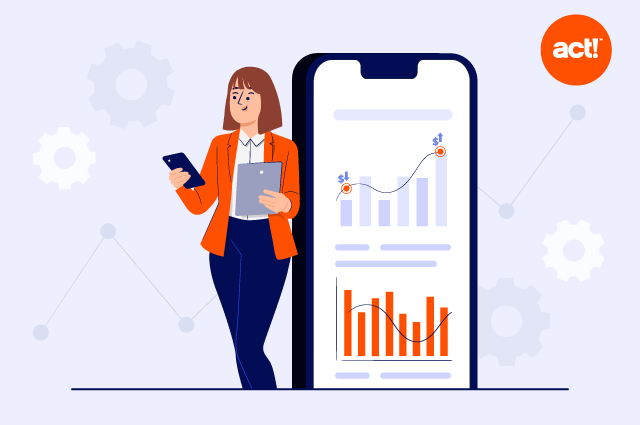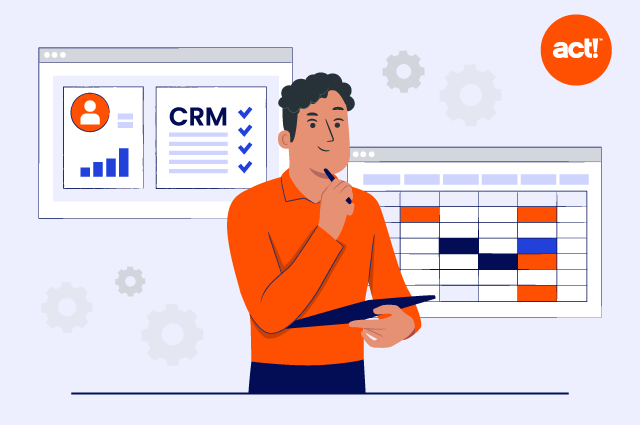
Building relationships with customers is essential for small and midsize businesses (SMBs) today. Customer expectations have shifted from fair pricing and quality service to personalized interactions, proactive service, and a seamless experience across multiple channels.
Eighty percent of customers say the experience a company provides is just as important as its services and products. This makes managing customer relationships and experiences vital for increasing revenue and brand loyalty.
Customer relationship management (CRM) software helps small businesses manage interactions with potential and existing customers to provide a consistent, personalized experience. The beauty of a CRM is that it can be customized to fit perfectly within any business’s workflow. With its many features, it can do much more for your business than simple spreadsheets. Here’s a look at how small businesses use CRMs and why you should upgrade.

Why a CRM is important for small businesses
A CRM stores client and customer information like purchase history, specific contact information like birthdays and anniversaries, financial demographics, and purchasing preferences. It provides a comprehensive view of your customers so you can maintain engaging and consistent interactions.
Your customer base is one of your biggest assets, so it deserves a lot of attention. When implemented correctly, the return on investment (ROI) of CRM software can be more than 245 percent. But, managing customer and client data can be challenging as businesses grow because increased revenue comes with more buyers to manage.
Fortunately, a CRM can scale as your company grows, making it easier to manage data and engage with customers for a personalized touch that boosts brand loyalty and turns buyers into big fans. CRM software allows you to establish a long-term relationship with customers because you can learn everything about their behaviors and needs and offer a seamless customer experience. Engaged customers are also more likely to return and recommend your products and services to friends and family.
What are the benefits of CRM for small businesses?

Spoiler alert: You’ll find that the right CRM system makes running a business much easier. Here’s how it can help yours.
Improve customer satisfaction
Because CRM software helps record all customer interactions and organize the data, you can customize their experience and provide more support. You’ll learn their preferences, any issues they had, and past purchases they’ve made.
Learning as much as you can about your customers can help you anticipate problems before they happen so you can fix any issues before they negatively impact the buyer’s experience.
Grow your business
CRM solutions provide the tools small business owners and sales reps need to identify potential customers, increase revenue and grow. The right software helps you manage all communications in one place so you can manage more data, improve sales productivity and scale effectively.
Data organization & management
To increase sales and revenue, you need to analyze customer information. That can be downright frustrating when the information you need is in multiple places. The best CRM for a small business integrates with software you’re already using like QuickBooks or Calendly, gathers data from these multiple touchpoints, and helps you store and analyze customer information all in one place.
The right CRM helps you make informed decisions with customized dashboards and reports that provide accurate and meaningful data and insights. You don’t need to worry about miscalculations or faulty data because the software does the analysis for you. Plus, you can personalize the dashboard to your needs and automate regular reports to gain more insights.
Streamline team communication and collaboration
The COVID-19 pandemic forever changed the way we do business. Many small businesses now have employees that work remotely. CRM features help team members communicate and work together in one dashboard with the information they need in a centralized location.
Optimize your marketing
The best CRM solutions integrate with marketing automation, a powerful marketing tool that helps you create cost-effective and aligned sales and marketing strategies so you or your marketing team can satisfy your customers’ needs. Marketing automation enables you to send automated messages to your leads and customers at prescheduled times and share online promotions, company announcements, new content, and helpful resources all of which improve brand recognition and customer retention. Plus, with marketing automation, you can easily segment clients so they only see the promotions they want and discover and you can easily gauge which ones bring in more money than others.
How do small businesses use CRM?

Fortunately, there are several all-in-one, cost-effective CRM and email marketing software platforms that meet numerous small business needs. Their combined powerful functionality makes implementing them a worthwhile investment for today’s small businesses.
But small business CRM is much more than a system to store data; it can help you qualify your leads for a more effective sales process. This software can also automatically prompt you to engage at the right time to ensure marketing campaigns are successful.
Small business owners are currently using CRM software to streamline their processes, customer engagement, and forecasting in numerous ways, including:
- Contact management
- Customer support
- Sales pipeline management
- Revenue and profitability tracking
- Organization workflows
- Sales and marketing strategy alignment
- Customer data analysis
- Communication automation
These core features help you better support your customers, communicate effectively as a team and be more proactive in solving problems to provide customers with the best possible experience.
A CRM system can help your small business organize and analyze the loads of data you use to improve conversion rates, streamline workflows and processes, and fine-tune its marketing strategies. Consider a CRM system your best employee for eliminating wasted time.
How to grow your business with CRM
Once you decide it’s time to invest in a CRM, choosing the right one for your small business is crucial for stable business growth and scalability. The right software integrates customer service, sales, and marketing all in one place. Common helpful features include:
- Revenue forecasting
- Email customer integration
- Sales data organization
- Ease of use
- Sales analytics
- Central dashboard
- Reporting
- Mobile CRM
- Two-way file syncing and sharing
Here are some questions you can ask yourself when determining which CRM is best for your needs:
- What type of customer support is available?
- How user-friendly is the software?
- Is it cloud-based or self-hosted?
- How will the CRM integrate and enhance your existing workflow?
- Is it scaleable?
- What extra features do you need, and will you have to pay more for them?
Wondering how your small business can use CRM?
CRM software allows small business owners to be more efficient and do more with fewer resources and employees. The right features set you up for success, increase your income, and grow your business.
With intelligent data analysis, you have all the information you need to make smart marketing decisions, tailor your customer experience, and build brand awareness.
Want to see CRM in action? Try Act! free for 14 days. No download or credit card is required.






